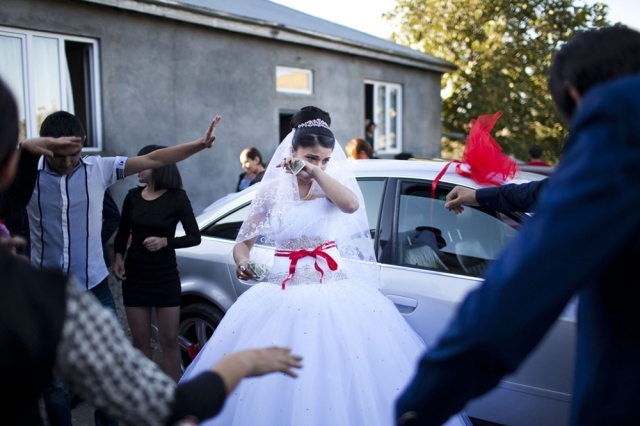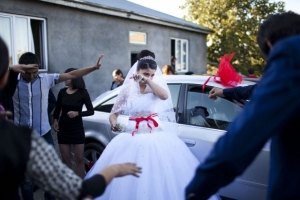Girls Make Up 95% of Underage Marriages in Georgia
TBILISI - The issue of child marriages has recently come to the attention of the Georgian government, who have been under increased scrutiny by the civil society to halt the practice of marrying off mostly young girls to older men.
Early marriage is a severe problem in Georgia. Both forced marriages and the practice of engagement are common. The practice is particularly prominent in regions mostly inhabited by Muslim ethnic minorities.
On March 25th, Georgia’s Public Defender's Office released a report which emphasized that in the last two years 1276 juveniles legalized their marriages in the Ministry of Justice, and major part of them (95%) were girls, 1449 juveniles also became parents.
The special report “Early Age Marriages: Challenges and Solutions” emphasized that young people often drop out schools because of early age marriages.
Dropping out of school before completing the basic level of education is especially alarming in rural parts of Georgia. Because of traditions and local community rules young people prefer to "legalize" their relationship by engagement or marriage and thus protect themselves from staining their reputation.
According to data by the Ministry of Education and Science 408 students between ages 13 - 17 and 168 students at the age of 18, dropped out of school in 2015.
“Teachers and principals did not have information that they should have registered the causes of school drop out by students and should have made relevant notifications. However, the majority of them noted that almost none of the girls graduate school in their villages exactly due to early marriage. This gives us grounds to believe that after the introduction of the register system, the data may be further increased,” the report said.
Related Story: Pankisi Imams Refuse to Recognize Child Marriages
Prevention of Child Marriages
Sexual intercourse with a person under the age of 16 is punishable by the Criminal Code of Georgia.
Despite the fact that the practice of marrying off mostly young girls to older men and persons under the age of 16 is quite high, the rate of responses to such cases is quite low.
The Chief Prosecutor’s Office announced that compared to 2014, the rate of criminal prosecution under Article 140 of the Criminal Code of Georgia increased by 74% in 2015; in 2014 criminal proceedings was launched under Article 140 against 33 persons, while in 2015 the figure was 1294.
Therefore, the study of the cases shows that the main challenges are lack of public awareness and inefficient delivery of services.
In December 2015, the Parliament of Georgia adopted a bill in the third reading, which tightened marriage registration rules for persons between 17 and 18 years old.
From now, in case of teenage marriages, only the court is granted to authorize a marriage license.
In addition, a worthy condition for registration of marriage was clarified and the term of validity for the provision was defined as one year.
In 2014, Article 1501 – Coercion of Marriage – was added to the Criminal Code of Georgia. However, according to the data provided by the Prosecutor's Office, no criminal prosecution was launched under this article in 2015.
Grounds of early marriages in Georgia
The Department of Gender Equality of the Ombudsmen’s Office organized information and focus group meetings in various regions of Georgia in order to study the issue in depth.
The survey results showed that the population, including children, does not have adequate information on the illegal nature of the forced marriage.
The practise that it is "a family affair", which people try not to interfere with, is still effective.
Teachers do not feel the responsibility either and do not act in compliance with the law when they are informed of early marriages.
“I think that the Internet and freedom brought all this. I am a teacher and I lose one girl each year. Too much freedom is given to 14-16-year-old girls. I think everything was different 20 years ago. Maybe lack of perspective was also a reason for this,” teacher from Sagarejo, Georgia’s eastern town commented.
“It is a worrying trend that teachers are against pregnant girls’ attendance at classes and think that this is unacceptable,” Georgian Ombudsmen Ucha Nanuashvili said.
Another problem regarding early marriages is that most girls do not have information about sexual and reproductive health and rights. They do not know how to act in case of pregnancy and what is the availability of abortion, privacy issues, etc. They are not aware of contraceptives.
“The main challenges are the low level of public awareness, gaps in service delivery and ineffective response mechanism. These problems are particularly obvious in the mountainous areas and in the regions populated by ethnic minorities, where access to services is complicated by a number of reasons,” Nanuashvili concluded.
By Tamar Svanidze
Edited by Chloe Diamond
Photo: Daro Sulakauri












